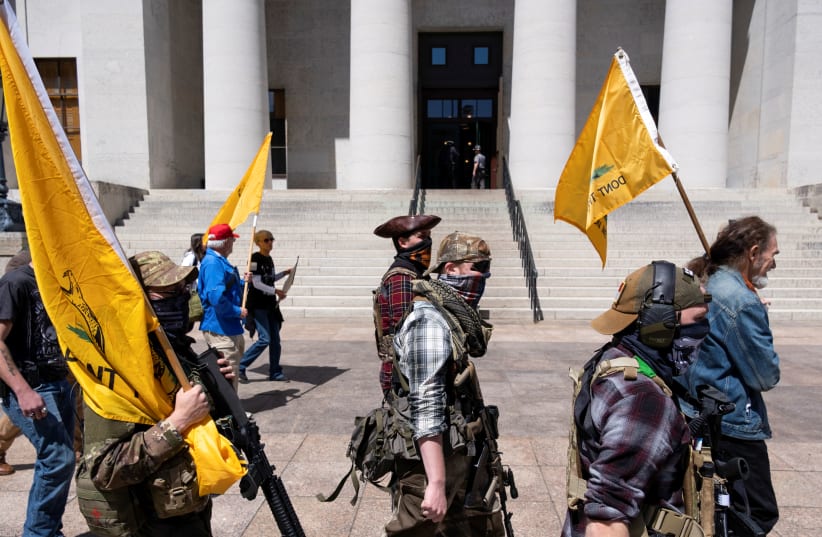DETROIT/LANSING, Mich., - Hundreds of protesters gathered at Michigan's state Capitol in Lansing on Thursday to protest Governor Gretchen Whitmer's request to extend the state of emergency to combat COVID-19, an appeal Republican lawmakers there have opposed.
The protest appeared to be the largest in the state since April 15, when supporters and allies of President Donald Trump organized thousands of people for "Operation Gridlock," jamming the streets of Lansing with their cars to call out what they said was the overreach of Whitmer's strict stay-at-home order.
That was one of the country's first major anti-lockdown rallies, and helped sparked a wave of similar events nationwide.
The slow reopening of state economies around the country has taken on political overtones, as Republican politicians and individuals affiliated with Trump's re-election promoted protests in electoral battleground states, such as Michigan.
Many people at Thursday's protest, including militia group members carrying firearms and people with pro-Trump signs, appeared to be ignoring state social-distancing guidelines as they clustered together within 6 feet of each other. Few people wore masks.
"Governor Whitmer, and our state legislature, it's over with. Open this state," Mike Detmer, a Republican U.S. congressional candidate running for the state's 8th district spot held by Democrat Elissa Slotkin, told the crowd. "Let's get businesses back open again. Let's make sure there are jobs to go back to."
Other speakers at the "American Patriot Rally," which had different organizers than the mid-April protest, questioned the deadliness of COVID-19, the respiratory illness caused by the novel coronavirus. They also said Whitmer's stay-at-home order violated constitutional rights, and urged people to open their businesses on May 1 in disregard of her order.
As the event began around 9 a.m. under steady rainfall, some protesters chanted "USA" and "lock her up," referring to Whitmer, a Democrat, but alluding to a refrain often chanted at 2016 Trump rallies directed at Hillary Clinton.
'FREEDOM OF SPEECH'
State authorities have warned that protesters could be ticketed for violating social-distancing rules. The mayor of Lansing, Andy Schor, said in a statement on Wednesday that he was "disappointed" protesters would put themselves and others at risk, but recognized that Whitmer's order still allowed people to "exercise their First Amendment right to freedom of speech."
Whitmer has acknowledged that her order was the strictest in the country. Protesters, many from more rural, Trump-leaning parts of Michigan, have argued it has crippled the economy statewide even as the majority of deaths from the virus are centered on the southeastern Detroit metro area.
Many states, including Georgia, Oklahoma, Alaska, South Carolina and Ohio, have already moved to restart parts of their economies following weeks of mandatory lockdowns that have thrown nearly one in six American workers out of their jobs.
Organizers of the mid-April protest in Michigan took credit when Whitmer later in April rolled back some of the most controversial elements of her order, such as bans on people traveling to their other properties.
State legislative approval of Whitmer's state of emergency declaration, which gives her special executive powers, is set to expire after Thursday.
She has asked for a 28-day extension, though Republican lawmakers in control of the statehouse who want to see a faster economic opening have signaled they could reject her request.
Regardless, Whitmer's stay-at-home order is set to continue through May 15, though she has said she could loosen restrictions as health experts determine new cases of COVID-19 are being successfully controlled.
On Wednesday, she said the construction industry could get back to work starting May 7.
Public health authorities warn that increasing human interactions now without appropriate safety measures may spark a fresh surge of infections.
